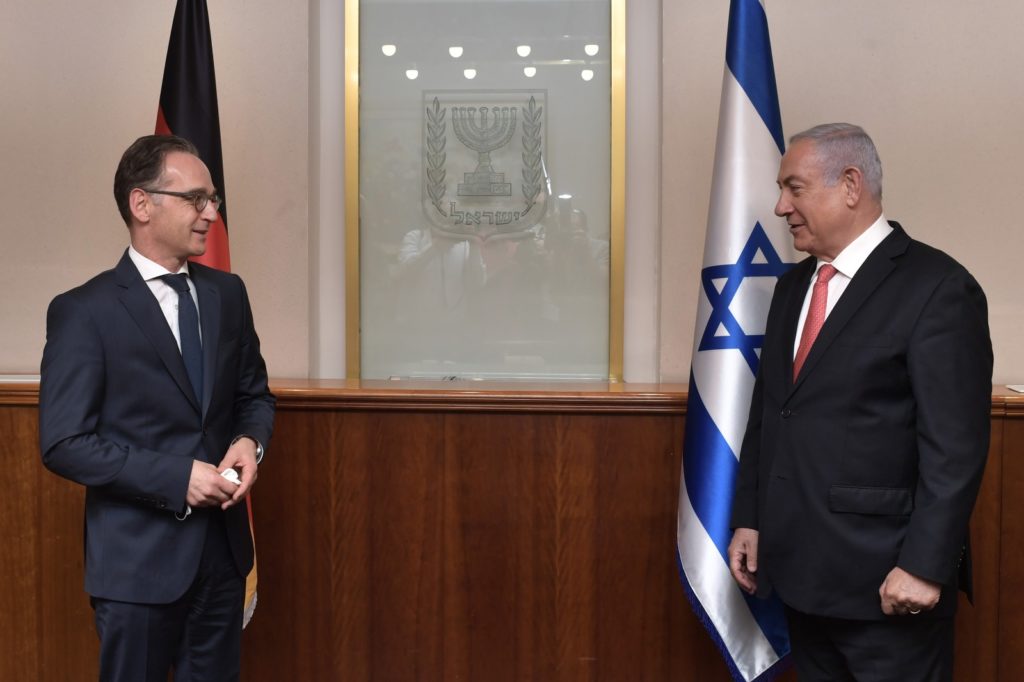
The same day as German Foreign Minister Heiko Maas’s first visit to Israel since the new government was formed, Berlin’s top diplomat confirmed it is “now a matter of priority to prevent” Israel from declaring sovereignty over Jewish communities in Judea and Samaria under the Trump Administration peace plan, according to a German press release. The comments were made in a videoconference with Jordanian and Palestinian officials on Wednesday, following meetings with Israeli leaders.
Under the Trump peace plan, Israeli sovereignty over pre-existing Jewish communities in the Biblical heartland of Judea and Samaria would be recognized by the United States, while the Palestinians could obtain statehood under certain conditions. Germany feels differently about the approach to the Jewish land in Judea and Samaria, which is also claimed by Palestinians. Israeli Prime Minister Benjamin Netanyahu, in his conversation with Maas on Sunday talking about the Trump plan, “insisted that Israel’s vital interests—such as the need for complete security control west of the Jordan River—be upheld in future agreement,” according to a press release from Netanyahu’s office summarizing the comments.
The statement continued by saying Netanyahu also told Maas “that any realistic plan must recognize the reality of Israeli settlement on the ground and not foster the illusion of uprooting people from their homes”—a key factor in Israel’s push to declare sovereignty over those communities.
The German Foreign Federal Foreign Office didn’t publish a press release to their website of Maas’s conversation with Netanyahu and only briefly recapped their talk on Twitter with no substantive details. However, the office did recap his conversation with Jordanian and Palestinian officials via videoconference, in which the three government officials made their declaration to prioritize an effort to stop Israel from declaring as their own the Jewish communities in the Biblical heartland.
Maas, Jordanian Foreign Minister Ayman Safadi and Palestinian Prime Minister Mohammad Shtayyeh also discussed how to “how to best start a fruitful engagement between the Israeli and the Palestinian side,” per the press release, with Safadi and Maas offering support towards such a process. The Palestinians have repeatedly rejected or demanded preconditions to peace talks over the years and have already rejected the Trump peace plan.
In addition to speaking with Netanyahu and Jordanian and Palestinian officials, Maas also met with new Israeli Foreign Minister Gabi Ashkenazi, who defended the Trump plan.
“There are currently significant regional opportunities, most notably President Trump’s Peace Initiative. It is an important milestone for the region, and it represents a significant opportunity,” said Ashkenazi, according to a press release published to the Israeli Ministry of Foreign Affairs website. “The plan will be pursued responsibly, in full coordination with the United States, while maintaining Israel’s peace agreements and strategic interests. Israel wants peace and security.”
Maas’ visit wasn’t all about the peace plan. The Iranian nuclear threat was also discussed, with the press summary of the meeting from Netanyahu’s office saying the Israeli leader “insisted on the need to increase the pressure on Iran and emphasized that the International Atomic Energy Agency had determined that Iran is continuing to violate its commitments and conceal sites suspected of military nuclear activity.”
Israel has backed the Trump Administration’s rejection of the Iran nuclear deal—known as the Joint Comprehensive Plan of Action (JCPOA)—and subsequent sanctions campaign against Iran aiming to change Iranian behavior. Germany, on the other hand, has been part of the European effort to evade American sanctions on Iran.
Maas also met with new Israeli Defense Minister Benny Gantz, with a Twitter post from Germany’s Foreign Office noting that the two officials had a “good exchange on the developments in the region, Iran and #JCPoA, cooperation with Jordan and the Middle East Peace Process.”
(By Joshua Spurlock, www.themideastupdate.com, June 10, 2020)
